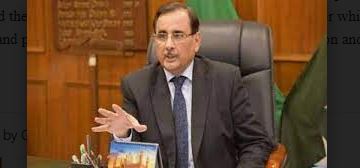Anjum Nisar says SBP’s reserves drop by more than $4b since April 2022
ISLAMABAD, /DNA/ – The Federation of Pakistan Chambers of Commerce and Industry’s Businessmen Panel (BMP) has said the trade and industry has to be kept solvent and protected from default for which prudent measures would have to be taken, such as removing restriction on imports along with strict monitoring of the central bank of forex companies to help stabilize the local currency, as the country’s total liquid foreign exchange reserves held by the State Bank have plunged by $784 million to a nearly four-year low of $6.72 billion.
FPCCI former president and BMP Chairman Mian Anjum Nisar pointed out that the strategy of curbing imports was not growth-friendly. He expressed concern about the country’s ability to pay back the huge amount of foreign loans. The frequent concerns have depressed the market and the exchange rate remained unstable during the ongoing fiscal year.
He said that the foreign exchange reserves should remain the top agenda of the government. However, SBP’s reserves have dropped by more than $4 billion from around $11 billion at the time when this government took the helm in April 2022.
BMP is in favor of export expansion and this is where we should plan to focus our efforts to take this forward for sustained economic growth. He said that our tax to GDP percentage is very low at 9.2 percent. We have to do better in order to achieve economic stability but we will undertake reforms in a gradual and orderly fashion in this regard.
Quoting the figures, the Businessmen Panel (BMP) Chief said that net foreign reserves held by commercial banks now stand at $5.867bn, meaning the country’s total liquid foreign reserves are now $12.58 billion. Central bank currently holds $6.72bn, barely enough to cover over one month’s worth of imports.
Anjum Nisar says the falling reserves may make it more difficult for the country to repay foreign loans; the remaining amount of over $6.7bn is just to cover a month’s imports.
He said that during the last five months, inflows remained just $4 billion but the figure was expected to rise in the second half of the current fiscal year ending June 2023.
FPCCI former president attributed the fall in foreign exchange reserves to a payment of $1 billion against the maturity of sukuk (Islamic bonds). However, he said the $6.7 billion reserves were not calculated after the payment for bonds.
He said that the SBP paid $1 billion and another $1.2 billion to two commercial banks, which have agreed to relend the same amount in a few days.
The country is now expecting another tranche from the International Monetary Fund (IMF), but the ninth-review talks have been delayed apparently due to Fund’s criticism over an increased fiscal deficit. The government is unwilling to impose more taxes for higher revenues, while the IMF insists the government must consolidate the economy.
He believed the government needed to generate additional revenue of about Rs800 billion to get the next IMF tranche. However, the political cost of squeezing this extra revenue from citizens is too high for the present government, which is the main hurdle, he said.
He said that the demand for dollars remains high in the interbank market, while the open market offers no hard currency. The dollar rose 0.09pc to close at Rs224.37 in the interbank market during the week.
However, most market players don’t trust the rates given by the State Bank, saying the deals were actually being done at higher prices.
He said that it was a positive indication that the rupee had started to appreciate against greenback majorly due to less import and partially owing to the SBP’s strict monitoring of the foreign exchange operations. He expected that with controlled import bill and lower trade deficit, the rupee is expected to gradually strengthen. He said that the rupee depreciation has been overdone and driven by only sentiments. The rupee has overshot due to concerns about domestic politics and the IMF program. The local currency had fallen by 23 percent in 2022 on fears of delay in the IMF program, falling FX reserves and increased political noise.
He said that Charter of Economy is imperative for the economic survival of Pakistan and all political parties must realize the gravity of the situation and sign it in greater interest of the nation and country. He said that the value of their capital had recorded a steep decline and their assets had now been reduced to almost nil. He said the government was playing a role of silent spectator while dollar appreciation coupled with heavy taxation, hike in interest rate, tariff of electricity, gas and patrol had further increased their cost of production and they had been forced to close down their businesses to save them from further losses.

















